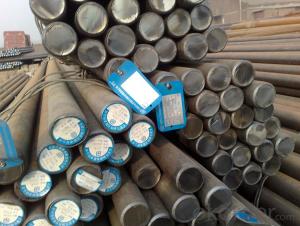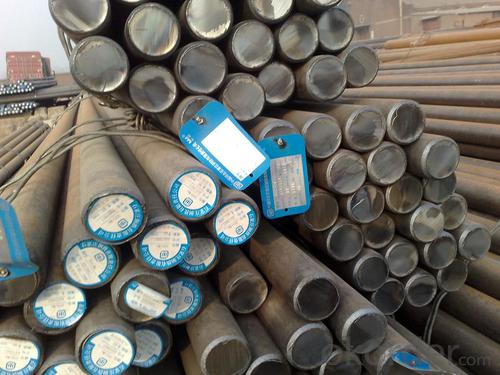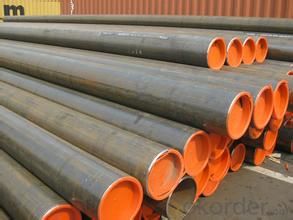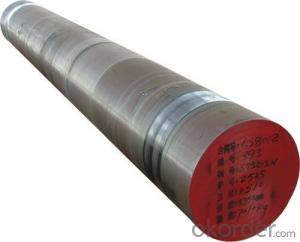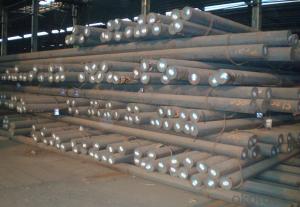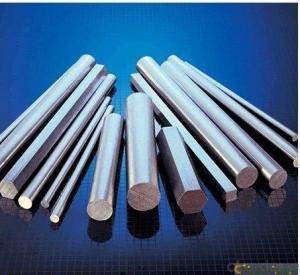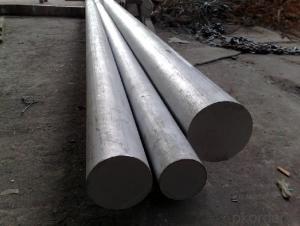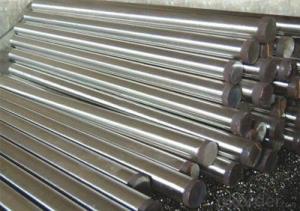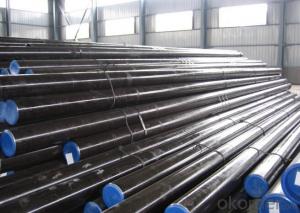Alloy Steel Spring Steel Round 9260 Forged Steel
- Loading Port:
- China main port
- Payment Terms:
- TT OR LC
- Min Order Qty:
- 30 m.t.
- Supply Capability:
- 10000 m.t./month
OKorder Service Pledge
OKorder Financial Service
You Might Also Like
Specification
Product information:
Alloy Steel 6150 Spring Steel Bars
Specification
1. Produce Standard: GB, AISI, ASTM, SAE, EN, BS, DIN, JIS
2. Produce processes: Smelt Iron -EAF smelt Billet - ESR smelt Billet -Hot rolled or forged get the steel round bar and plate
3. Heat treatment: Normalized / Annealed / Quenched+Tempered
4. Quality assurance: All order we can received third party inspection, You can let SGS, BV,.. and others test company test and inspect our products before Goods shipping.
5. Applications: 6150 steel is a kind of advanced spring steel , used for important spring with a large cross-section and high load,and the valve spring, piston, spring, the relief valve spring with working temperature below 300 ℃ .
| Available Specification | |||
| Round Bar | Diameter (mm) | Length (mm) | |
| 5-1500 | 2000-5800 | ||
| Plate | Thickness (mm) | With (mm) | Length (mm) |
| 20-1000 | 200-1500 | 2000-5800 | |
| The specification can be customised! | |||
| Chemical Composition | ||||||||
| Grade | C | Si | Mn | P | S | Cr | Ni | V |
| AISI 6150 | 0.48-0.53 | 0.15-0.35 | 0.70-0.90 | ≤0.035 | ≤0.050 | 0.80-1.10 | — | ≥0.15 |
| DIN 51CrV4 | 0.47-0.55 | ≤0.40 | 0.70-1.10 | ≤0.035 | ≤0.035 | 0.90-1.20 | — | 0.10-0.25 |
| BG 50CrV | 0.46-0.54 | 0.17-0.37 | 0.50-0.80 | ≤0.030 | ≤0.030 | 0.80-1.10 | ≤0.035 | 0.10-0.20 |
Product Show:
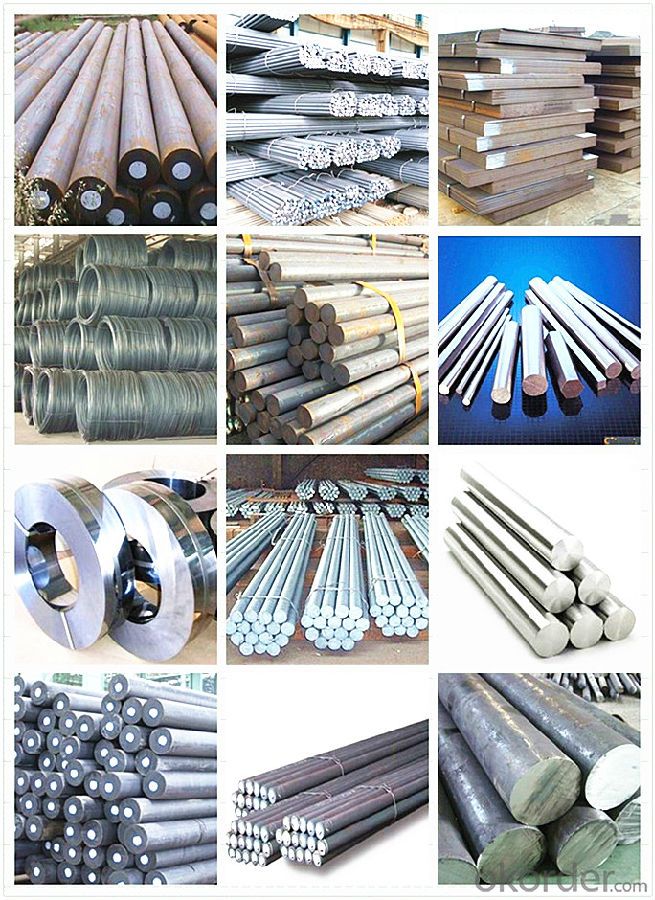
Workshop Show:
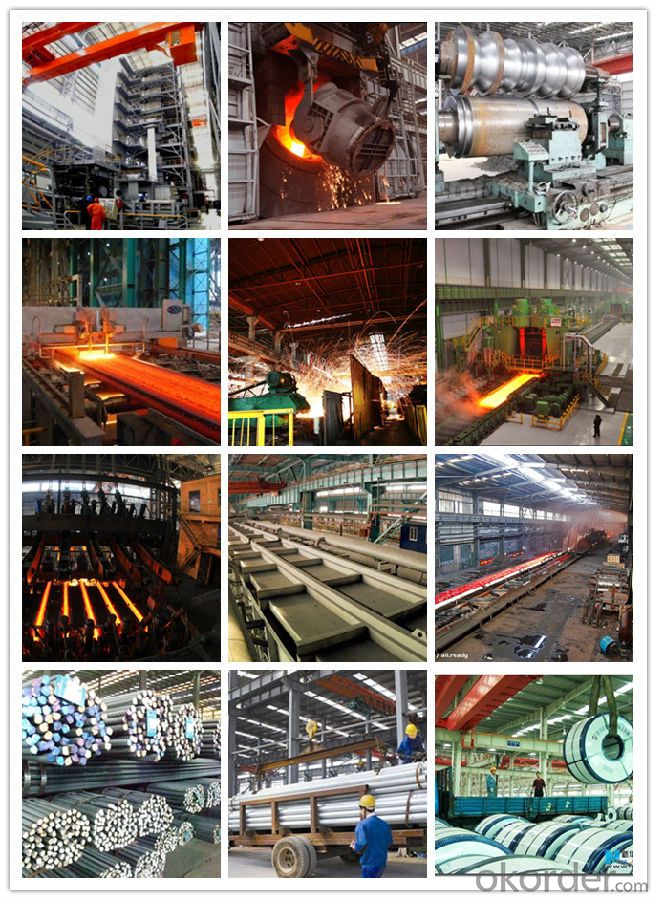
Shipping
1. FedEx/DHL/UPS/TNT for samples, Door-to-Door;
2. By Air or by Sea for batch goods, for FCL; Airport/ Port receiving;
3. Customers specifying freight forwarders or negotiable shipping methods!
Delivery Time: 3-7 days for samples; 5-25 days for batch goods.
Payment Terms
1.Payment: T/T, L/C, Western Union, MoneyGram,PayPal; 30% deposits; 70% balance before delivery.
2.MOQ: 1pcs
3.Warranty : 3 years
4.Package Informations: 1) EXPORT, In 20 feet (GW 25 ton) or 40 feet Container (GW 25 ton)
2)as customer's requirement
Why choose us?
(1) The leading exporter in China special steel industry.
(2) Large stocks for various sizes, fast delivery date.
(3) Good business relationship with China famous factories.
(4) More than 7 years steel exporting experience.
(5) Good after-sales service guarantee.
- Q: How does special steel contribute to the heavy equipment industry?
- Special steel contributes to the heavy equipment industry by offering enhanced strength, durability, and resistance to wear and tear. It enables the production of high-performance components and parts, such as gears, axles, and blades, that can withstand heavy loads, extreme temperatures, and harsh environments. The use of special steel in heavy equipment ensures improved safety, increased productivity, and longer service life, making it a critical material for the industry.
- Q: How is shock-resistant alloy steel used in the production of impact-resistant parts?
- Shock-resistant alloy steel is used in the production of impact-resistant parts due to its unique properties that make it highly resistant to deformation and fracture under high impact loads. The alloy steel's composition includes elements such as chromium, nickel, and molybdenum, which enhance its toughness and durability. These properties allow the alloy steel to absorb and disperse the energy generated during impact, effectively protecting the parts from damage. Additionally, the shock-resistant alloy steel's high strength enables it to withstand repeated impacts without losing its structural integrity, making it an ideal material for manufacturing impact-resistant parts used in various industries, including automotive, aerospace, and construction.
- Q: What are the factors that affect the wear resistance of special steel?
- There are several factors that affect the wear resistance of special steel, including the composition of the steel itself, the hardness of the steel, the presence of any alloying elements, the microstructure of the steel, and the heat treatment process used. Other factors such as the type and intensity of the wear, environmental conditions, and lubrication also play a role in determining the wear resistance of special steel.
- Q: How is special steel used in the medical industry?
- Special steel is used in the medical industry for a variety of applications such as surgical instruments, implants, and medical devices. The properties of special steel, including its strength, corrosion resistance, and biocompatibility, make it ideal for these purposes. It ensures the safety and effectiveness of medical procedures, allowing for precise and durable tools and implants that are essential for patient care.
- Q: What are the different methods of preventing hydrogen-induced cracking in special steel?
- There are several methods that can be employed to prevent hydrogen-induced cracking in special steel: 1. Preheating: By preheating the steel before welding or any other high-temperature process, the risk of hydrogen-induced cracking can be reduced. Preheating helps in reducing the cooling rate of the steel, allowing hydrogen to diffuse out before it can cause cracking. 2. Heat treatment: Applying specific heat treatment processes like stress relieving or post-weld heat treatment can help alleviate hydrogen-induced cracking. These processes help in reducing residual stresses and promoting hydrogen diffusion, minimizing the risk of cracking. 3. Material selection: Choosing steel alloys with a higher resistance to hydrogen-induced cracking can be an effective preventive measure. Certain steel compositions, such as low carbon or low alloy steels, are less susceptible to cracking in the presence of hydrogen. 4. Hydrogen control during welding: Implementing techniques to minimize the introduction of hydrogen during welding is crucial. This can be achieved through the use of low-hydrogen welding consumables, such as low-hydrogen electrodes, and ensuring proper shielding gas coverage to prevent atmospheric moisture from contaminating the weld. 5. Stress management: Controlling the welding or operational stresses on the steel is important to prevent cracking. This can be achieved by using proper welding techniques, such as avoiding excessive heat input or rapid cooling rates, as well as minimizing the introduction of tensile stresses during welding. 6. Coating or surface protection: Applying protective coatings or surface treatments to the steel can act as a barrier against hydrogen absorption. These coatings can provide an additional layer of protection, reducing the risk of hydrogen-induced cracking. 7. Welding process optimization: Optimizing the welding parameters, such as current, voltage, and travel speed, can help reduce the risk of hydrogen-induced cracking. By adjusting these parameters, the heat input and cooling rate can be controlled, minimizing the potential for hydrogen absorption and subsequent cracking. It is important to note that a combination of these preventive measures is often necessary to effectively mitigate the risk of hydrogen-induced cracking in special steel. Additionally, proper inspection and quality control procedures should be implemented to ensure the integrity of the steel and detect any cracks or defects.
- Q: Can special steel be used in the production of fasteners?
- Yes, special steel can be used in the production of fasteners. Special steel, such as stainless steel or alloy steel, has enhanced properties such as corrosion resistance, high strength, or heat resistance, making it suitable for various applications in industries where fasteners are commonly used.
- Q: What are the different methods for quenching special steel?
- Achieving the desired mechanical properties and improving the hardness and strength of special steel requires a critical step in the heat treatment process known as quenching. There are several methods available, each with their own advantages and considerations. One commonly used method is oil quenching, where the steel component is submerged in oil to act as a cooling medium. This provides a moderate cooling rate, allowing for controlled and uniform hardening. It is suitable for a wide range of steel grades and helps prevent cracking or distortion. Water quenching, on the other hand, is a faster cooling method compared to oil quenching. It extracts heat rapidly, resulting in higher hardness and strength. However, the high cooling rate can increase the risk of cracking or distortion, especially with thicker sections. Water quenching is commonly used for low-alloy steels and some high-alloy steels. Polymer quenching involves using a specialized polymer solution as the cooling medium. This method offers a controlled cooling rate, striking a balance between the slower oil quenching and faster water quenching. It is particularly suitable for steels with complex shapes or critical dimensions, as it reduces the risk of distortion and cracking. Air quenching, on the other hand, is a slower cooling method that allows the steel component to cool in ambient air. It is typically used for steels with lower hardenability, providing a more gradual cooling rate. While it helps reduce the risk of distortion and cracking, it may result in lower hardness and strength compared to other quenching methods. Finally, salt bath quenching involves immersing the steel component in a molten salt bath as the cooling medium. This method provides a controlled and uniform cooling rate, minimizing the risk of distortion and cracking. It is particularly suitable for complex-shaped or delicate parts, as it reduces thermal stress during cooling. It is important to consider various factors, such as steel grade, desired hardness, component size and shape, and required mechanical properties when choosing a quenching method. Proper selection and implementation of the method are crucial to achieving the desired material characteristics and ensuring the overall quality of the special steel product.
- Q: How does special steel contribute to reducing product maintenance requirements?
- Special steel contributes to reducing product maintenance requirements by offering superior strength, durability, and resistance to corrosion and wear. This means that products made with special steel are less likely to break, degrade, or require frequent repairs or replacements. Its high-quality properties enable longer product lifespans and enhanced performance, ultimately minimizing maintenance efforts and costs for users.
- Q: How does special steel contribute to the nuclear industry?
- The nuclear industry heavily relies on special steel for multiple reasons. To begin with, this type of steel is exceptionally resistant to corrosion and can endure extreme temperatures and pressures. As a result, it is an ideal material for constructing nuclear reactors and other components, ensuring the safety and longevity of nuclear power plants. Additionally, special steel is used in manufacturing fuel assemblies and storage containers for nuclear fuel. These containers must effectively contain radioactive materials without any leakage or contamination. Special steel possesses the necessary strength and durability to meet these requirements. Furthermore, special steel is crucial in the fabrication of steam generators, which are essential components in nuclear power plants. Steam generators transfer heat from the reactor to the turbines, generating electricity. Given the high temperature and pressure conditions inside steam generators, it is essential to use a material that can withstand these harsh circumstances. Special steel fulfills this requirement. Moreover, special steel is employed in the production of control rods. These rods play a vital role in regulating the nuclear reaction within the reactor core by being inserted or withdrawn to control the rate of fission and maintain a stable reaction. Special steel's mechanical properties and resistance to radiation damage ensure the reliability and effectiveness of control rods. Additionally, special steel is utilized in constructing shielding materials and containment structures. These structures aim to protect workers, the environment, and the general public from radiation exposure. Due to its excellent radiation shielding properties, special steel is the preferred material for these applications. In conclusion, special steel is essential to the nuclear industry as it provides the necessary strength, durability, and resistance to corrosion, heat, and radiation. It enables the safe and efficient operation of nuclear reactors, facilitates the storage and transportation of nuclear fuel, and safeguards personnel and the environment.
- Q: What are the different methods for joining special steel?
- Special steel, commonly used in applications requiring high strength, corrosion resistance, or specific mechanical properties, can be joined using various methods. Some of the most frequently employed methods include: 1. Welding: The most commonly used technique for joining special steel is welding. Different welding methods can be utilized, such as arc welding (including shielded metal arc welding, gas metal arc welding, and flux-cored arc welding), resistance welding (spot welding, seam welding), and laser welding. Welding necessitates the use of filler material to bond the steel components together, resulting in strong and durable joints. 2. Brazing: The process of joining special steel through brazing involves the use of a filler material (typically a brass or bronze alloy) with a lower melting point than the base steel. The filler material is heated until it melts and flows into the joint, creating a robust bond. Brazing is commonly employed for joining dissimilar metals or when the base steel possesses a high melting point. 3. Soldering: Similar to brazing, soldering involves the use of a filler material with a lower melting point to join special steel. However, soldering usually employs a non-ferrous filler material, such as tin-lead or tin-silver alloys. Soldering is frequently utilized for joining electronic components or fragile parts that cannot endure high temperatures. 4. Mechanical Fastening: Special steel can also be joined using mechanical fasteners, including bolts, screws, rivets, or clips. This method is often chosen when the joint needs to be easily disassembled or when welding or brazing is impractical or undesirable. 5. Adhesive Bonding: Adhesive bonding involves the use of specialized adhesive or glue to join special steel. This method is suitable when joining thin or delicate steel components or when the joint requires high resistance to vibration or shock. Adhesive bonding can create a strong and durable bond, although it may not be suitable for high-temperature or high-stress applications. When selecting the appropriate method for joining special steel, it is crucial to consider the specific requirements of the application, such as strength, corrosion resistance, temperature resistance, and desired permanence of the joint. Each method possesses its own advantages and limitations, and choosing the right approach ensures a robust and dependable joint.
Send your message to us
Alloy Steel Spring Steel Round 9260 Forged Steel
- Loading Port:
- China main port
- Payment Terms:
- TT OR LC
- Min Order Qty:
- 30 m.t.
- Supply Capability:
- 10000 m.t./month
OKorder Service Pledge
OKorder Financial Service
Similar products
Hot products
Hot Searches
Related keywords
